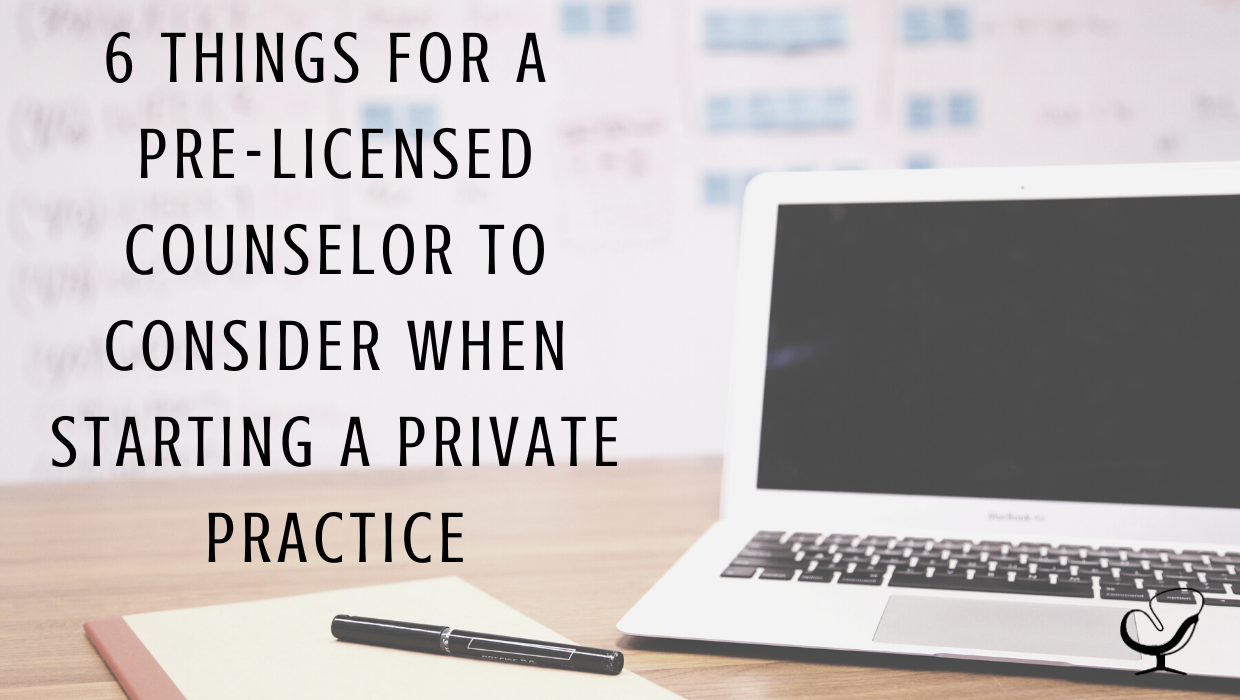Starting a private practice is hard work. A private practice owner has to be concerned with marketing, website, renting office space, furniture, and things like, are you going to use an electronics note-taking service? What about online counseling services? Ethics. Continuing education. Networking. Accounting. And the list keeps going…Doing all that takes up a lot of brain space. If you are pre-licensed, however, that list gets even longer. Because many pre-licensed practitioners have added responsibilities with attaining their therapy license. And there are a few extra ethical considerations, as well.
So, if you are like me — a pre-licensed, private practice owning therapist — you’re going to want a few things in place to help you on the journey to starting your private practice and building it into a success. Here are six things to consider:
Six Things To Consider When Starting a Private Practice As a Pre-Licensed Counselor
Step #1 — A Relationship with the State’s Licensing Board:
You’re going to need to know the expectations of your state’s licensing board. Are you going to need a supervisor? Does your practice need to operate in the same space as your supervisor? How many hours are required to become fully licensed and how often do you have to report your hours? What about responsibilities with continuing education? These are all responsibilities that you will want to have information about. And your state’s licensing board will have the answers. If you haven’t yet, you’ll want to get to know who your best contact is with the board is and what their typical response time is. Find out what the important dates are for your practice and your licensure. Put it in your calendar and set a reminder. It will save you the headache of unknowingly missing deadlines.
Step #2 — A Good Clinical Supervisor:
There is a lot to juggle if you decide to start a private practice as a pre-licensed counselor. While trying to start a business, you are also likely perfecting your craft as a counselor. You will want to have a good clinical supervisor to bounce questions off with regards to your theory and modality. Even more important, you will want a supervisor who is organized and knowledgeable with regards to ethics. Again, there is a lot that goes into your craft as a counselor and business owner. You really want to have a supervisor who has got your back – and not just in it for the financial bonus.
Step #3 — A Business Mentor or Consultant:
Not many therapists got an education in how to start, manage, or grow a business while pursuing that master’s degree in counseling or social work. You’re probably okay that they didn’t add one more class to the required coursework. Still, it is amazing to be able to go to people who know the blueprint to starting a private practice. Whether you decide to go with someone local to where you are, join Next Level Practice, or jump into a mastermind group, it is a really good idea to find a group of supportive people to push you in business.
You’re a helper. Business might not come naturally. Self-promotion or marketing likely won’t feel comfortable. This is why getting a business consultant or mentor is so important. Set yourself up for success by regularly talking to people who will help you get a business plan in place.
Step #4 — A Good Referral Network:
This is a biggie. If you are pre-licensed and unable to accept insurance, then you won’t be getting insurance companies referring people to you. That means you will need to build up a referral network. Networking can be challenging for many in the helping profession. We don’t like to talk about ourselves. Good news! You don’t have to talk about yourself (too much) in order to succeed at networking. In fact, asking great questions can often be the best way to leave a lasting impression. And what is more natural for a counselor than asking a great question?
Step #5 — An Ideal Client:
So…what do you say about yourself when the person you are networking asks? You tell them about who you serve. And the best way to be focused during that conversation is to know who your ideal client is. Who are the people you like to work with? What are some life challenges they are facing? What do you offer as a clinician that will help them?
Step #6 — Some Financial Savings Before Starting a Private Practice:
I had this dream that if I set up shop and do a little work on helping people find me, then my schedule will fill up. Yeah…it hasn’t really been that way. Six months into my private practice, I’m still working hard to consistently get up to ten clients a week. Some counseling businesses start filling up with clients in a matter of weeks. They get a crazy amount of calls or emails from Psychology Today (not me!), or have a great referral base when first launching (again, not me!). For others, it takes months to build up enough clients to start covering the costs of the practice. And then a few more months to be able to start paying yourself a salary. It is wise to either have a part-time job while building up your practice, or enough savings set aside to keep you afloat for about six months. This will enable you the time to give your full attention to building your practice up.
Starting a Private Practice Isn’t Easy But It’s Worth It
I’m not going to lie. Starting out as a pre-licensed therapist takes just a little extra effort. Building the right support network and having the right information will make your steps much easier. And this helps with building up your practice. Knowing where to go when you need information is so valuable. It will save you money, energy, and effort. And frustration, as well.
Jason Wilkinson
Jason Wilkinson lives in Portland, Oregon with his wife and two kids. He is the owner of a private mental health practice, Wellspace Counseling, located in Tualatin, Oregon. Jason loves helping people achieve their goals of mental and emotional wellness, spending time with his family, and watching the Los Angeles Dodgers.
You can find more information on Jason Wilkinson and his practice at www.wellspacepdx.com.


